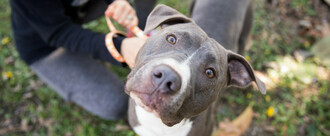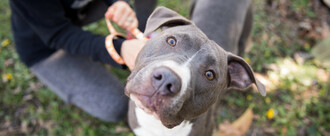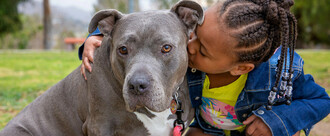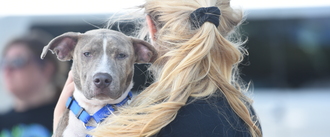End Breed-Restrictive Practices by Insurance Companies
Insurance companies can charge responsible pet owners higher premiums, deny insurance coverage, or even drop their insurance policies altogether based solely on a dog’s breed or appearance. This not only hurts these dogs and their families, but also the many large dogs in shelters waiting to be rescued.
That’s why we need you to sign the petition urging your state's insurance commission to protect consumers and focus on the behavior of the dog. Use the form below to find a petition targeting your state insurance commission. Then sign and share this petition with friends and family and help build momentum for this campaign (or share this graphic).
Enter the name of your state in the form below to get started.
Note: Five states [New York, Nevada, Pennsylvania, Arizona and Michigan] have laws prohibiting insurance companies from targeting owners based on their dog's breed. If you live in one of those states and are experiencing restrictions from your insurance provider, please use this site to file a complaint.
Find your local campaign
Your Location

Campaigns (53)
-
End Breed-Restrictive Insurance Practices in Rhode IslandThere is a wide range of dogs falling within the category of “risk” breeds according to some insurance companies including Boxers, Giant Schnauzers, German Shepherds, Chows, Great Danes, Alaskan Malamutes, American Staffordshire Terriers, Akitas, Cane Corsos, American Bulldogs, Belgian Malinois, Keeshonds, Rhodesian Ridgebacks, Ovtcharkas, Siberian Huskies, Dobermans, Pit Bulls, Dalmatians, Rottweilers, Australian Cattle dogs and more. The National Association of Insurance Commissioners [NAIC] should protect pet-owning consumers. Insurance companies should focus on the behavior of the dog. Dogs with aggressive behavior should not be protected by any moratorium. This is important because dogs are viewed by the vast majority of Americans as part of the family, and the ability for people to keep families together should be protected. Breed-restrictive insurance practices can force responsible pet owners to give up their pets and increase the number of pets in shelters. The likelihood a dog will bite is based on many factors such as socialization of the dog, obedience training, supervision provided by the owner, and how the victim interacts with the dog. It has not been proven by scientific evidence that aggressive behavior is present in any particular breed of dog. Insurance companies that want to reduce risk should focus solely on behavior of the dog and the behavior of the owner.148 of 200 Signatures
-
Poner fin a las prácticas de seguros que restringen la raza en FloridaHay una gran variedad de perros que entran en la categoría de razas "de riesgo" según algunas compañías de seguros, como los bóxers, los schnauzers gigantes, los pastores alemanes, los chows, los gran daneses, los malamutes de Alaska, los staffordshire terrier americanos, los akitas, los corsos de Caña, los bulldogs americanos, los malinois belgas, los keeshonds, los ridgebacks de Rodesia, los ovtcharkas, los huskies siberianos, los dobermans, los pitbulls, los dálmatas, los rottweilers y los perros boyeros australianos, entre otros. La Asociación Nacional de Comisarios de Seguros [NAIC] debería proteger a los consumidores propietarios de mascotas. Las compañías de seguros deberían centrarse en el comportamiento del perro. Los perros con comportamiento agresivo no deberían estar protegidos por ninguna moratoria. Esto es importante porque los perros son vistos por la gran mayoría de los estadounidenses como parte de la familia, y la capacidad de las personas para mantener las familias unidas debe ser protegida. Las prácticas de seguro restrictivas en materia de razas pueden obligar a los propietarios responsables de mascotas a renunciar a ellas y aumentar el número de mascotas en los refugios. La probabilidad de que un perro muerda se basa en muchos factores, como la socialización del perro, el adiestramiento de obediencia, la supervisión proporcionada por el propietario y la forma en que la víctima interactúa con el perro. No se ha demostrado científicamente que el comportamiento agresivo esté presente en ninguna raza de perro en particular. Las compañías de seguros que quieran reducir el riesgo deben centrarse únicamente en el comportamiento del perro y en la conducta del propietario.144 of 200 SignaturesCreated by Caity K.
-
End Breed-Restrictive Insurance Practices in WyomingThere is a wide range of dogs falling within the category of “risk” breeds according to some insurance companies including Boxers, Giant Schnauzers, German Shepherds, Chows, Great Danes, Alaskan Malamutes, American Staffordshire Terriers, Akitas, Cane Corsos, American Bulldogs, Belgian Malinois, Keeshonds, Rhodesian Ridgebacks, Ovtcharkas, Siberian Huskies, Dobermans, Pit Bulls, Dalmatians, Rottweilers, Australian Cattle dogs and more. The National Association of Insurance Commissioners [NAIC] should protect pet-owning consumers. Insurance companies should focus on the behavior of the dog. Dogs with aggressive behavior should not be protected by any moratorium. This is important because dogs are viewed by the vast majority of Americans as part of the family, and the ability for people to keep families together should be protected. Breed-restrictive insurance practices can force responsible pet owners to give up their pets and increase the number of pets in shelters. The likelihood a dog will bite is based on many factors such as socialization of the dog, obedience training, supervision provided by the owner, and how the victim interacts with the dog. It has not been proven by scientific evidence that aggressive behavior is present in any particular breed of dog. Insurance companies that want to reduce risk should focus solely on behavior of the dog and the behavior of the owner.137 of 200 Signatures
-
Poner fin a las prácticas de seguros que restringen la raza en CaliforniaHay una gran variedad de perros que entran en la categoría de razas "de riesgo" según algunas compañías de seguros, como los bóxers, los schnauzers gigantes, los pastores alemanes, los chows, los gran daneses, los malamutes de Alaska, los staffordshire terrier americanos, los akitas, los corsos de Caña, los bulldogs americanos, los malinois belgas, los keeshonds, los ridgebacks de Rodesia, los ovtcharkas, los huskies siberianos, los dobermans, los pitbulls, los dálmatas, los rottweilers y los perros boyeros australianos, entre otros. La Asociación Nacional de Comisarios de Seguros [NAIC] debería proteger a los consumidores propietarios de mascotas. Las compañías de seguros deberían centrarse en el comportamiento del perro. Los perros con comportamiento agresivo no deberían estar protegidos por ninguna moratoria. Esto es importante porque los perros son vistos por la gran mayoría de los estadounidenses como parte de la familia, y la capacidad de las personas para mantener las familias unidas debe ser protegida. Las prácticas de seguro restrictivas en materia de razas pueden obligar a los propietarios responsables de mascotas a renunciar a ellas y aumentar el número de mascotas en los refugios. La probabilidad de que un perro muerda se basa en muchos factores, como la socialización del perro, el adiestramiento de obediencia, la supervisión proporcionada por el propietario y la forma en que la víctima interactúa con el perro. No se ha demostrado científicamente que el comportamiento agresivo esté presente en ninguna raza de perro en particular. Las compañías de seguros que quieran reducir el riesgo deben centrarse únicamente en el comportamiento del perro y en la conducta del propietario.136 of 200 SignaturesCreated by Caity K.
-
End Breed-Restrictive Insurance Practices in MississippiThere is a wide range of dogs falling within the category of “risk” breeds according to some insurance companies including Boxers, Giant Schnauzers, German Shepherds, Chows, Great Danes, Alaskan Malamutes, American Staffordshire Terriers, Akitas, Cane Corsos, American Bulldogs, Belgian Malinois, Keeshonds, Rhodesian Ridgebacks, Ovtcharkas, Siberian Huskies, Dobermans, Pit Bulls, Dalmatians, Rottweilers, Australian Cattle dogs and more. The National Association of Insurance Commissioners [NAIC] should protect pet-owning consumers. Insurance companies should focus on the behavior of the dog. Dogs with aggressive behavior should not be protected by any moratorium. This is important because dogs are viewed by the vast majority of Americans as part of the family, and the ability for people to keep families together should be protected. Breed-restrictive insurance practices can force responsible pet owners to give up their pets and increase the number of pets in shelters. The likelihood a dog will bite is based on many factors such as socialization of the dog, obedience training, supervision provided by the owner, and how the victim interacts with the dog. It has not been proven by scientific evidence that aggressive behavior is present in any particular breed of dog. Insurance companies that want to reduce risk should focus solely on behavior of the dog and the behavior of the owner.136 of 200 Signatures
-
End Breed-Restrictive Insurance Practices in Puerto RicoThere is a wide range of dogs falling within the category of “risk” breeds according to some insurance companies including Boxers, Giant Schnauzers, German Shepherds, Chows, Great Danes, Alaskan Malamutes, American Staffordshire Terriers, Akitas, Cane Corsos, American Bulldogs, Belgian Malinois, Keeshonds, Rhodesian Ridgebacks, Ovtcharkas, Siberian Huskies, Dobermans, Pit Bulls, Dalmatians, Rottweilers, Australian Cattle dogs and more. The National Association of Insurance Commissioners [NAIC] should protect pet-owning consumers. Insurance companies should focus on the behavior of the dog. Dogs with aggressive behavior should not be protected by any moratorium. This is important because dogs are viewed by the vast majority of Americans as part of the family, and the ability for people to keep families together should be protected. Breed-restrictive insurance practices can force responsible pet owners to give up their pets and increase the number of pets in shelters. The likelihood a dog will bite is based on many factors such as socialization of the dog, obedience training, supervision provided by the owner, and how the victim interacts with the dog. It has not been proven by scientific evidence that aggressive behavior is present in any particular breed of dog. Insurance companies that want to reduce risk should focus solely on behavior of the dog and the behavior of the owner.130 of 200 Signatures
-
Poner fin a las prácticas de seguros que restringen la raza en IllinoisHay una gran variedad de perros que entran en la categoría de razas "de riesgo" según algunas compañías de seguros, como los bóxers, los schnauzers gigantes, los pastores alemanes, los chows, los gran daneses, los malamutes de Alaska, los staffordshire terrier americanos, los akitas, los corsos de Caña, los bulldogs americanos, los malinois belgas, los keeshonds, los ridgebacks de Rodesia, los ovtcharkas, los huskies siberianos, los dobermans, los pitbulls, los dálmatas, los rottweilers y los perros boyeros australianos, entre otros. La Asociación Nacional de Comisarios de Seguros [NAIC] debería proteger a los consumidores propietarios de mascotas. Las compañías de seguros deberían centrarse en el comportamiento del perro. Los perros con comportamiento agresivo no deberían estar protegidos por ninguna moratoria. Esto es importante porque los perros son vistos por la gran mayoría de los estadounidenses como parte de la familia, y la capacidad de las personas para mantener las familias unidas debe ser protegida. Las prácticas de seguro restrictivas en materia de razas pueden obligar a los propietarios responsables de mascotas a renunciar a ellas y aumentar el número de mascotas en los refugios. La probabilidad de que un perro muerda se basa en muchos factores, como la socialización del perro, el adiestramiento de obediencia, la supervisión proporcionada por el propietario y la forma en que la víctima interactúa con el perro. No se ha demostrado científicamente que el comportamiento agresivo esté presente en ninguna raza de perro en particular. Las compañías de seguros que quieran reducir el riesgo deben centrarse únicamente en el comportamiento del perro y en la conducta del propietario.120 of 200 SignaturesCreated by Caity K.
-
WashingtonEnd Breed-Restrictive Insurance Practices in Washington DCThere is a wide range of dogs falling within the category of “risk” breeds according to some insurance companies including Boxers, Giant Schnauzers, German Shepherds, Chows, Great Danes, Alaskan Malamutes, American Staffordshire Terriers, Akitas, Cane Corsos, American Bulldogs, Belgian Malinois, Keeshonds, Rhodesian Ridgebacks, Ovtcharkas, Siberian Huskies, Dobermans, Pit Bulls, Dalmatians, Rottweilers, Australian Cattle dogs and more. The National Association of Insurance Commissioners [NAIC] should protect pet-owning consumers. Insurance companies should focus on the behavior of the dog. Dogs with aggressive behavior should not be protected by any moratorium. This is important because dogs are viewed by the vast majority of Americans as part of the family, and the ability for people to keep families together should be protected. Breed-restrictive insurance practices can force responsible pet owners to give up their pets and increase the number of pets in shelters. The likelihood a dog will bite is based on many factors such as socialization of the dog, obedience training, supervision provided by the owner, and how the victim interacts with the dog. It has not been proven by scientific evidence that aggressive behavior is present in any particular breed of dog. Insurance companies that want to reduce risk should focus solely on behavior of the dog and the behavior of the owner.120 of 200 Signatures
-
Poner fin a las prácticas de seguros que restringen la raza en TexasHay una gran variedad de perros que entran en la categoría de razas "de riesgo" según algunas compañías de seguros, como los bóxers, los schnauzers gigantes, los pastores alemanes, los chows, los gran daneses, los malamutes de Alaska, los staffordshire terrier americanos, los akitas, los corsos de Caña, los bulldogs americanos, los malinois belgas, los keeshonds, los ridgebacks de Rodesia, los ovtcharkas, los huskies siberianos, los dobermans, los pitbulls, los dálmatas, los rottweilers y los perros boyeros australianos, entre otros. La Asociación Nacional de Comisarios de Seguros [NAIC] debería proteger a los consumidores propietarios de mascotas. Las compañías de seguros deberían centrarse en el comportamiento del perro. Los perros con comportamiento agresivo no deberían estar protegidos por ninguna moratoria. Esto es importante porque los perros son vistos por la gran mayoría de los estadounidenses como parte de la familia, y la capacidad de las personas para mantener las familias unidas debe ser protegida. Las prácticas de seguro restrictivas en materia de razas pueden obligar a los propietarios responsables de mascotas a renunciar a ellas y aumentar el número de mascotas en los refugios. La probabilidad de que un perro muerda se basa en muchos factores, como la socialización del perro, el adiestramiento de obediencia, la supervisión proporcionada por el propietario y la forma en que la víctima interactúa con el perro. No se ha demostrado científicamente que el comportamiento agresivo esté presente en ninguna raza de perro en particular. Las compañías de seguros que quieran reducir el riesgo deben centrarse únicamente en el comportamiento del perro y en la conducta del propietario.112 of 200 SignaturesCreated by Caity K.
-
End Breed-Restrictive Insurance Practices in AlaskaThere is a wide range of dogs falling within the category of “risk” breeds according to some insurance companies including Boxers, Giant Schnauzers, German Shepherds, Chows, Great Danes, Alaskan Malamutes, American Staffordshire Terriers, Akitas, Cane Corsos, American Bulldogs, Belgian Malinois, Keeshonds, Rhodesian Ridgebacks, Ovtcharkas, Siberian Huskies, Dobermans, Pit Bulls, Dalmatians, Rottweilers, Australian Cattle dogs and more. The National Association of Insurance Commissioners [NAIC] should protect pet-owning consumers. Insurance companies should focus on the behavior of the dog. Dogs with aggressive behavior should not be protected by any moratorium. This is important because dogs are viewed by the vast majority of Americans as part of the family, and the ability for people to keep families together should be protected. Breed-restrictive insurance practices can force responsible pet owners to give up their pets and increase the number of pets in shelters. The likelihood a dog will bite is based on many factors such as socialization of the dog, obedience training, supervision provided by the owner, and how the victim interacts with the dog. It has not been proven by scientific evidence that aggressive behavior is present in any particular breed of dog. Insurance companies that want to reduce risk should focus solely on behavior of the dog and the behavior of the owner.112 of 200 Signatures










